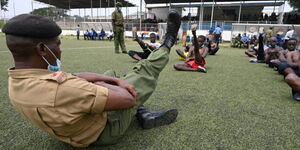The recent release of the John F. Kennedy (JFK) assassination archives by United States President Donald Trump revealed that the Central Intelligence Agency (CIA) operated a secret base in Nairobi, Kenya.
The files, declassified by Trump, exposed the CIA’s presence in Kenya, with Nairobi being one of six cities in Africa where the intelligence agency had established operations.
Aside from Nairobi, the other cities included Johannesburg and Pretoria in South Africa, Lagos in Nigeria, Rabat in Morocco, and Salisbury (now Harare) in Zimbabwe.
The files, which date back to the 1960s, indicated that the intelligence agency had been working to expand its influence on the African continent, particularly at a time when many African countries were gaining or had recently gained independence.
As is typical with the CIA, their exact intentions and motivations behind establishing the base were not disclosed, with the files containing little to no detail about their presence in the country. However, parallels can be drawn with the general logic of foreign intelligence agencies setting up operations in other nations to safeguard the interests of the countries they represent.
Even so, the CIA’s presence in Nairobi during the JFK administration suggested that the city served as a significant hub for the agency’s operations in Africa, playing a strategic role in intelligence gathering and diplomatic engagement, particularly during the Cold War era.
The files reflected a broader pattern of CIA interests in global operations, which likely included Nairobi, particularly in the context of countering Soviet influence and monitoring political movements.
While it remains unclear whether the base continued operating after President John F. Kennedy’s death, the CIA later entered into a formal partnership with the Kenyan police. This followed the 1998 bombings of the U.S. embassies in Nairobi and Dar es Salaam, after which the CIA intensified its operations in East Africa to combat terrorist threats.
In 2004, the CIA established a covert paramilitary unit within the Kenyan police known as the Rapid Response Team (RRT). This unit was part of a secretive programme designed to train and manage local paramilitary forces in global hotspots.
The initial group, dubbed 'Team 18,' comprised 18 officers selected by Kenyan authorities and trained in the United States.
The RRT operates from a base in Ruiru, east of Nairobi, and receives financial support, weapons, and equipment from the CIA. The unit collaborates closely with Kenya's National Intelligence Service (NIS) and has been involved in various counter-terrorism operations, including renditions and disruptions.
High-level engagements between U.S. intelligence officials and Kenyan leadership have underscored the importance of this relationship. In January 2024, former CIA Director William J. Burns visited Nairobi and met with President William Ruto to discuss counter-terrorism and regional stability.
Later that year, in October 2024, Burns made a second visit, coinciding with a meeting between President Ruto and the UK’s MI6 Chief, Richard Moore, highlighting Kenya's strategic importance in East Africa.
While specific details about the CIA's facilities in Nairobi remain undisclosed, these activities indicate a robust and ongoing collaboration between the CIA and Kenyan security agencies, with Nairobi serving as a central hub for intelligence and counter-terrorism operations in the region.
Trump’s decision to release the files is expected to open a can of worms, particularly for the CIA, which prides itself on its clandestine modus operandi. It will be interesting to see how the agency responds to the questions that arise following the exposure of some of its best-kept secrets.












